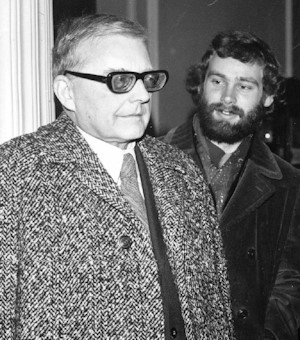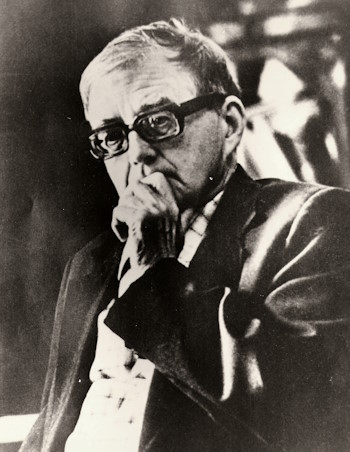Dmitri Shostakovich: a personal recollection
by Alan George
An old man sits upright and motionless in a hotel room, peering into a musical score just a few inches from his face. Across the table four young musicians are playing for him the music that his long impaired eyesight can barely discern on the pages. But his ears, in contrast, are as sharp as ever: a wrong note there! – a misprint, fortunately, rather than an error in execution. Dmitri Dmitrievich Shostakovich listens intently to his own fourth string quartet, then his sixth, then his seventh; the players are the Fitzwilliam String Quartet.
It would not be accurate to describe this scene as a “coaching” session; but no amount of instruction could replace the intimacy and enlightenment experienced that day in November 1972. Personal contact with a composer does not of itself guarantee “authentic” performances; but there can be no doubt that the direct and vital communication with him over those two days created a deep and unforgettable impression on us. It inspired us to a mission, a burning commitment to studying and playing his quartets as faithfully and selflessly as we could. We were also embarking on something of a crusade, since most of these works were hardly known at all in Western Europe or America. Indeed, it was out of frustration with this situation that my initial approach to Shostakovich arose, early in 1972. Knowing that a thirteenth quartet had been completed almost two years previously, but was still unperformed in this country, we (perhaps arrogantly!) felt an obligation to rectify the omission by playing it ourselves. It appeared that the likeliest means of obtaining the music – together with the necessary permission to present it – lay in writing to the composer himself! His reply contained not only the requested material, but a promise to come to York for the concert…… At the time I was somewhat perplexed as to why he should have been so enthusiastic about hearing a very young group play his music; but as I came to know him better I realised that, distressingly conscious of his age and advancing frailty, he must have felt reassured to know that this old-man’s-music (SIX years younger than I am now!) could live and thrive in young hands.
In 1975 he invited his “English friends” to spend a week with him at his dacha; six or seven quartets were mutually selected, on which we hoped to work with him in some detail. News of his death, five weeks or so before our scheduled departure, was devastating, and so hard to accept or come to terms with, despite awareness of his parlous physical condition. The following year we were invited to the USSR for a concert tour – at the request of his widow, Irina Antonovna, whom we have subsequently met a number of times – especially one occasion in the late 90s, when she seemed thrilled at the opportunity to meet the quartet’s two younger players, Lucy Russell and Daniel Yeadon.
And so it is that Shostakovich the man, as he appeared to the original members of the Fitzwilliam over 52 years ago, is enshrined for all time in the music of his last quartets. That is not to say that these are autobiographical works, because in intention (at least) they are not so: the feeling is altogether subtler, more spiritual even, than that. The experience of these quartets, whether through rehearsing, performing, or as a listener, really is like being in the company of Shostakovich himself: the personality of the man and his music seem to be as one, and it is the very nature of this personality which makes the experience so profound and unique, and so much in harmony with the essentially personal and intimate world of the String Quartet.
As recalled above, I had written to Shostakovich in the Spring of 1972, requesting his permission to perform the thirteenth quartet – already two years old, and it seemed shameful to me that it had not yet been heard in this country. He replied at once, not only consenting but welcoming the idea, and expressing the hope that he might be able to come and hear the performance himself. Not long afterwards he responded to my original request and sent a score and a set of parts, repeating his wish to come and hear us play. When I received notification of the time of his arrival I knew that he had been unfailing in his promise to us – the first of a number of occasions on which he was equally faithful to his word. I also think that, despite his extraordinary modesty, he was aware of how much it meant to us – or to any musician – to have the opportunity to play to him.

I had been delegated by my colleagues to meet the composer at York’s magnificent gothic railway station; and as I stood waiting, excitement and apprehension in turn prevented me from realising the composure with which I had hoped to greet him. Of course I recognised him instantly, but he was a much bigger man than I had expected. In fact he appeared a squarely built, powerful looking figure, yet physically very frail on account of his poor health. His face was white and drawn, yet behind a pair of very thick spectacles one was acutely conscious of his dark searching eyes. His reputation for being excessively nervous was soon amply justified, especially when confronted with anything more than the smallest group of people; but as he got to know us better he became more relaxed and quite talkative. He must have known that actually playing to him for the first time would be a real ordeal for us, so he suggested that we play the piece through to him during the afternoon, in order that we might feel more at ease in the concert itself. At the end he seemed satisfied, and confined his remarks to amending a few of his own dynamic marks (particularly for pizzicato) in the text. We were all deeply touched by his efforts to make us comfortable, and his insistence that plans for the day should be arranged to suit our convenience rather than his.
I don’t think that anyone who was fortunate enough to be present in the Lyons Concert Hall that night can have forgotten the occasion very quickly – over the years all manner of people have come out of the woodwork, claiming “I was there”! The man’s very presence was electrifying, and one had the overwhelming sensation that one was in the company of something indescribably great. Afterwards he was visibly overcome by the reception the audience gave him – something he must have been well used to, but to which he reacted as if it were the first time (we witnessed exactly the same at the Royal Festival Hall a few days later, after the British première of his fifteenth symphony). The following morning he invited us to his hotel to play some more of his music to him, and I particularly cherish the memory of those few hours: it was a priceless experience to be able to watch Shostakovich’s face while playing his own music to him, and to feel such a direct and vital communication with him.

As the train pulled out of the station his poor feeble hand continued waving until he was out of sight. In his subsequent letters to us he often recalled, with evident pleasure, his visit to York: surely for him it could have been no more than just one day in an enormously rich (if troubled) life; but for the four of us it was the memory of a lifetime. We did see him again a few days later, since he had asked us to come and hear his fifteenth symphony in London (the main purpose of his visit to England), after which we spent a little more time with him. I was backstage just before the concert when I happened to pass him in a group of officials; I decided not to bother him at that point, but on seeing me he immediately broke away to embrace me and shake my hand. I was astonished that he should have remembered and recognised us, and I felt completely overcome. From that time almost to his death he kept up a regular correspondence with us, the last letter being dated 2nd June 1975 (it must have been one of his very last letters – post-dating his final one to Isaak Gilkman in Story of a Friendship). Writing to us after receiving a tape of the thirteenth quartet he had requested we send, he mentioned that he had finished another quartet, and this we received early in March 1974. His covering letter began as follows: “Dear friends! Yesterday I sent you the score and parts of my fourteenth quartet. I shall be very glad if this work interests you and you include it in your repertoire…….” No.15 followed at the end of December, together with Christmas and New Year greetings (characteristically thoughtful that he should remember our Christmastide). He seemed genuinely surprised that anyone should be so keen to play his music, and phrases such as the following were commonplace in his letters: “… it gives me pleasure to know that you give so much attention to my quartets” or “thank you for the interest which you show in my works”.
Plans had been finalised for us to spend a week with him in Moscow, and we were due to leave on 17th September 1975. Too late. But even though the man is long dead his soul lives on, both in the music he created, and in the hearts of those of us who knew him. During his last visit to England many people must have met him and will have related their treasured experiences of him, as I myself am doing at this moment. But he was just that type of person, that unique being, which transcends its own greatness with simple humility, human warmth, and kindness (something many others of us would do well to learn from….).
© Alan George (February 1999/January 2000/July 2019/November 2024)


















